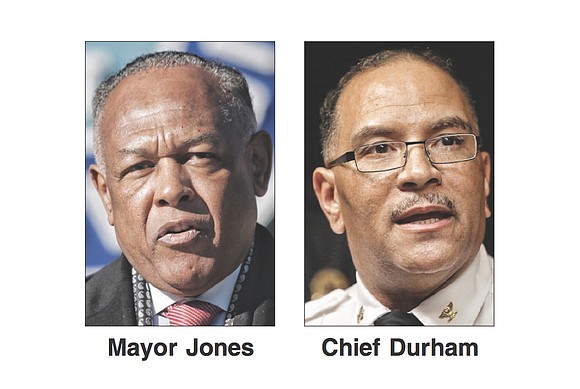Mayor Jones proposes less than half initially planned for city police
Jeremy M. Lazarus | 11/30/2016, 7:15 p.m.
Police Chief Alfred Durham is likely to get only half the money he had been promised to hire and train new recruits to help beef up staff at the Richmond Police Department.
Last week, Mayor Dwight C. Jones introduced legislation to Richmond City Council that calls for shifting about $1.7 million to the Police Department to hire 20 new recruits to be deployed in seven months. That’s well short of the $3.6 million the mayor stated in September he would seek to enable the department to hire 45 new recruits.
Amid worries about the declining number of city police officers, Council Vice President Chris A. Hilbert and other members indicated that a special council meeting might be held after Thanksgiving to speed up consideration of putting the $1.7 million into Richmond Police.
However, City Clerk Jean Capel said Monday that she has not received a request from Mr. Hilbert or anyone else to hold a special meeting, or to poll the members about a date for a special meeting. The only meeting on the calendar is the regularly scheduled meeting Monday, Dec. 12, the last one of the year.
The rising tide of shootings and homicides in the city is putting pressure on the outgoing mayor and City Council to invest more in public safety, with Chief Durham’s repeated reports showing his department is shorthanded.
He told the Free Press two weeks ago that the department had 684 officers on its active rolls, but only 663 were available due to sickness, disciplinary action and other absence. It is the smallest force in at least 12 years and far below his authorized strength of 750 officers.
The staff shortage is increasing the risks to officers and the response time to citizens’ calls, the council was told at the Nov. 14 meeting.
“Sectors are not being covered, officers are not getting backup in responding to violent calls” and officers are being called back to work on their days off, said Cheryl Ann Nici-O’Connell, founder and leader of Richmond United for Law Enforcement and a former Richmond police officer who still deals with the wounds she suffered when she was shot in the face in the 1980s.
She told the council that the situation is creating high stress and strain on officers, and a reason for veteran officers to leave for better conditions. They also are being lured away by offers of better pay that the city department cannot match, she said.
According to the Jones administration, the $1.7 million is all that is currently available in actual funds that can be shifted to meet the police chief’s request.
In a letter to the council Sept. 26, Mayor Jones notified the governing body that the city would likely have a $4.6 million surplus from the 2016 fiscal year that ended June 30 and that he would request at least $3.6 million be shifted to the police.
However, the administration has had to back off and limit its request because it once again will be late in completing its annual financial report, or CAFR, to certify the full surplus.
That report is now projected to be completed by March or April, the administration has advised the council, after winning approval to hire a new auditing firm.
At this point, the city has received only the $1.7 million from savings on health insurance and from a utilities project that can be used, the administration has advised. An additional $1.9 million to hire 25 more recruits would not be available until the CAFR is done in the spring.
In other business last week, the council voted 8-1 to reject a $635,000 state grant to cover about half the cost of overhauling a section of Reedy Creek and a portion of a tributary, Crooked Branch Creek, in South Side.
The city Department of Public Utilities had called the $1.2 million project, designed by experts in the field, essential to helping the city meet mandatory federal and state goals for reducing pollution and sediment flowing from the those creeks into the James River and, ultimately, the Chesapeake Bay.
However, the City Council backed away from the grant after hearing from opponents. The DPU plan had generated enormous backlash from people living near that section of Reedy Creek. Joined by other experts and advocates, the neighbors denounced the plan because it would have required clearing hundreds of trees from the beloved 7.4-acre park in the area between 41st and 46th streets bounded by Forest Hill Avenue, Crutchfield and Roanoke streets and Westover Hills-Belt Boulevard.
Opponents told the council the DPU proposal would denude a cherished woods, drive away deer, owls and other wildlife and destroy important archaeological treasures in the small park that sits north of George Wythe High School, but do little to reduce pollution and erosion.
The council also approved a partnership with VCU Police to improve communications with Richmond Police and cleared the way for development of two 16-story apartment towers along Hull Street near the 14th Street Bridge.
The council also authorized the Richmond Redevelopment and Housing Authority to issue $36 million in bonds to finance a new 278-unit apartment complex at Semmes Avenue and 14th Street in South Side, a new addition to the Manchester development boom.
The council, as expected, also voted to maintain the current real estate tax rate of $1.20 per $100 of assessed value and rejected a 2-cent cut in the rate. City Council’s action overrode a state law that requires real estate tax rates to be reduced when property values are going up. Richmond’s experienced a 3 percent increase in property values. The tax rate would have been rolled back to $1.18 per $100 of assessed value without council’s vote.








